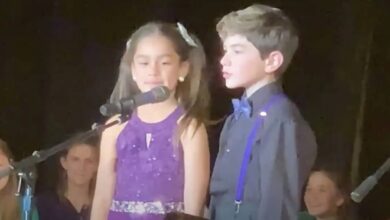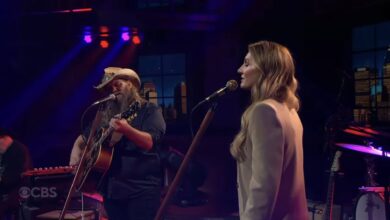The Song That Touched Millions: Alan Jackson’s ‘Where Were You’ Live at the CMA Awards
Alan Jackson’s performance of “Where Were You (When the World Stopped Turning)” at the 2001 CMA Awards stands as a poignant moment in music history, marking a sensitive response to the tragic events of September 11, 2001. Two months after the attacks, Jackson took the stage to debut this heartfelt ballad, a song that resonated deeply with a nation in mourning. The emotional weight of the performance was palpable, reflecting the collective grief, confusion, and yearning for understanding that many were experiencing during that time.
Written in the early hours of a Sunday morning, the song came to Jackson almost as a revelation. He awoke with the chorus in his mind, feeling compelled to capture the emotions surrounding that fateful day. With the lyrics, he posed introspective questions about people’s reactions to the tragedy, connecting with listeners on a personal level. The simplicity of the song’s message belied its profound impact, allowing fans to reflect on their own experiences and emotions from that day.
During the CMA Awards, Jackson’s performance was marked by both vulnerability and strength. As he sang, he embodied the feelings of a nation grappling with loss and uncertainty. The audience, moved by his sincerity, responded with overwhelming support, turning the performance into a shared moment of catharsis. His ability to convey such raw emotion in a live setting cemented the song’s significance in the country music canon and beyond.
The success of “Where Were You” was immediate and lasting. The song reached the top of the Billboard country charts, spending five weeks at number one. It garnered numerous accolades, including the Grammy Award for Best Country Song, along with honors from the Country Music Association (CMA) and the Academy of Country Music (ACM). This recognition further highlighted Jackson’s skill as a songwriter and his connection to the country music audience.
Despite initially thinking he might phase the song out of his performances over time, Jackson discovered that “Where Were You” remained a vital part of his setlist. Each time he sang it, he witnessed the emotional reactions of fans, many of whom still held their lighters aloft, moved by the memory of that day. The song’s enduring relevance reminded him of the importance of music as a form of healing and connection.
Jackson has expressed that he feels a deep sense of pride in contributing to the emotional landscape of that time through his music. He sees the song as a gift, a way to articulate the collective grief and resilience of the American people. In interviews, he has mentioned that even though he doesn’t consider himself a political man, the song allowed him to engage with the nation’s feelings authentically.
As he continues to perform, Jackson reflects on the song’s legacy and its power to evoke memories of unity and compassion. The lyrics encourage listeners to examine their own feelings and experiences, making it a timeless anthem for reflection. The questions he poses serve as a reminder of the various ways individuals coped with the aftermath of the tragedy, fostering a sense of community through shared grief.
Beyond its commercial success, “Where Were You” has found a place in the hearts of many, often being performed at memorials and commemorative events. Jackson’s heartfelt delivery continues to resonate, serving as a reminder of the strength found in vulnerability and the role of music in processing collective trauma.
Alan Jackson’s impact on country music is profound. With a career spanning several decades, he has become known not just for his musical talent but for his ability to connect with audiences on a personal level. His storytelling style and dedication to authenticity have made him a beloved figure in the genre. “Where Were You (When the World Stopped Turning)” stands out as a testament to his artistry, capturing a moment in time that will forever be etched in the memories of those who experienced it.





